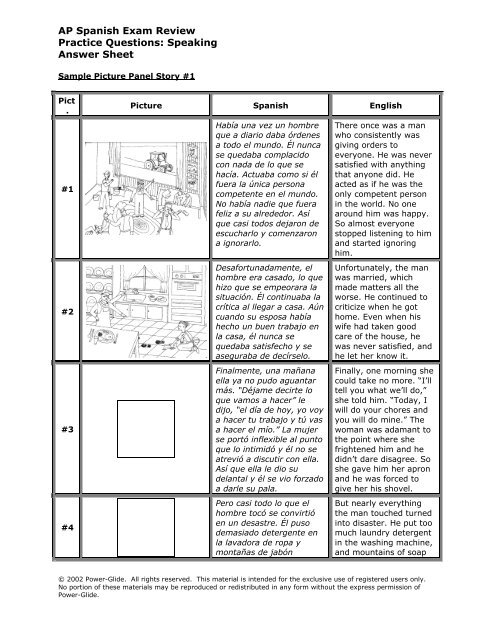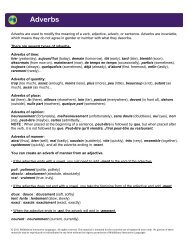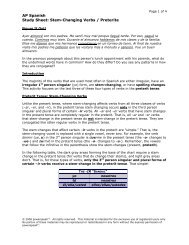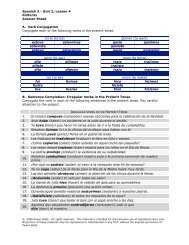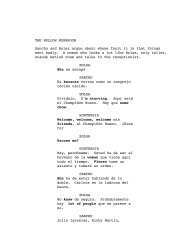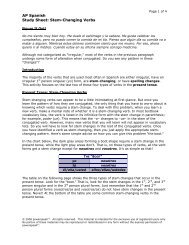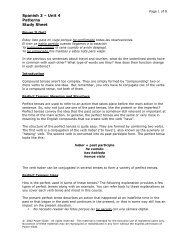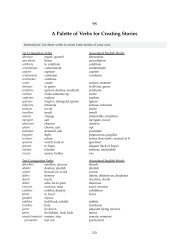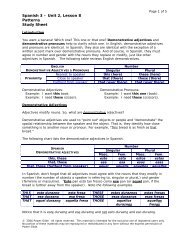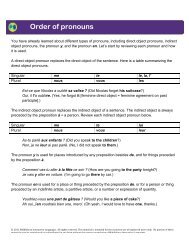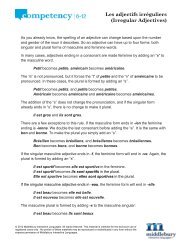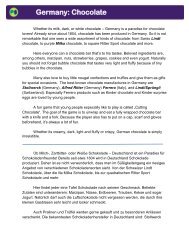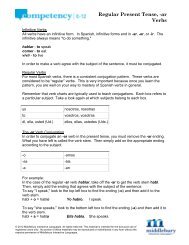AP Spanish Exam Review Practice Questions: Speaking Answer ...
AP Spanish Exam Review Practice Questions: Speaking Answer ...
AP Spanish Exam Review Practice Questions: Speaking Answer ...
You also want an ePaper? Increase the reach of your titles
YUMPU automatically turns print PDFs into web optimized ePapers that Google loves.
<strong>AP</strong> <strong>Spanish</strong> <strong>Exam</strong> <strong>Review</strong><br />
<strong>Practice</strong> <strong>Questions</strong>: <strong>Speaking</strong><br />
<strong>Answer</strong> Sheet<br />
Sample Picture Panel Story #1<br />
Pict<br />
.<br />
#1<br />
#2<br />
#3<br />
#4<br />
Picture <strong>Spanish</strong> English<br />
Había una vez un hombre<br />
que a diario daba órdenes<br />
a todo el mundo. Él nunca<br />
se quedaba complacido<br />
con nada de lo que se<br />
hacía. Actuaba como si él<br />
fuera la única persona<br />
competente en el mundo.<br />
No había nadie que fuera<br />
feliz a su alrededor. Así<br />
que casi todos dejaron de<br />
escucharlo y comenzaron<br />
a ignorarlo.<br />
Desafortunadamente, el<br />
hombre era casado, lo que<br />
hizo que se empeorara la<br />
situación. Él continuaba la<br />
crítica al llegar a casa. Aún<br />
cuando su esposa había<br />
hecho un buen trabajo en<br />
la casa, él nunca se<br />
quedaba satisfecho y se<br />
aseguraba de decírselo.<br />
Finalmente, una mañana<br />
ella ya no pudo aguantar<br />
más. “Déjame decirte lo<br />
que vamos a hacer” le<br />
dijo, “el día de hoy, yo voy<br />
a hacer tu trabajo y tú vas<br />
a hacer el mío.” La mujer<br />
se portó inflexible al punto<br />
que lo intimidó y él no se<br />
atrevió a discutir con ella.<br />
Así que ella le dio su<br />
delantal y él se vio forzado<br />
a darle su pala.<br />
Pero casi todo lo que el<br />
hombre tocó se convirtió<br />
en un desastre. Él puso<br />
demasiado detergente en<br />
la lavadora de ropa y<br />
montañas de jabón<br />
There once was a man<br />
who consistently was<br />
giving orders to<br />
everyone. He was never<br />
satisfied with anything<br />
that anyone did. He<br />
acted as if he was the<br />
only competent person<br />
in the world. No one<br />
around him was happy.<br />
So almost everyone<br />
stopped listening to him<br />
and started ignoring<br />
him.<br />
Unfortunately, the man<br />
was married, which<br />
made matters all the<br />
worse. He continued to<br />
criticize when he got<br />
home. Even when his<br />
wife had taken good<br />
care of the house, he<br />
was never satisfied, and<br />
he let her know it.<br />
Finally, one morning she<br />
could take no more. “I’ll<br />
tell you what we’ll do,”<br />
she told him. “Today, I<br />
will do your chores and<br />
you will do mine.” The<br />
woman was adamant to<br />
the point where she<br />
frightened him and he<br />
didn’t dare disagree. So<br />
she gave him her apron<br />
and he was forced to<br />
give her his shovel.<br />
But nearly everything<br />
the man touched turned<br />
into disaster. He put too<br />
much laundry detergent<br />
in the washing machine,<br />
and mountains of soap<br />
© 2002 Power-Glide. All rights reserved. This material is intended for the exclusive use of registered users only.<br />
No portion of these materials may be reproduced or redistributed in any form without the express permission of<br />
Power-Glide.
<strong>AP</strong> <strong>Spanish</strong> <strong>Exam</strong> <strong>Review</strong><br />
<strong>Practice</strong> <strong>Questions</strong>: <strong>Speaking</strong><br />
<strong>Answer</strong> Sheet<br />
#5<br />
#6<br />
salieron de la lavadora y<br />
rebozaron por toda la<br />
casa. Los niños corrían por<br />
toda la casa con sus pies<br />
enlodados y su hija se<br />
entretenía, poniendo las<br />
impresiones de sus manos<br />
en las paredes. En<br />
resumen, la casa era un<br />
desastre total.<br />
Pasadas ciertas horas, su<br />
esposa regresó a la casa y<br />
encontró a su esposo<br />
sentado en el portal de la<br />
casa llorando mientras su<br />
casa se quemaba. Sólo<br />
quedaba parte de la<br />
estructura de la casa.<br />
Finalmente, su esposo ya<br />
no se quejaba, ni tampoco<br />
le estaba dando órdenes a<br />
nadie a su alrededor.<br />
Un día el hombre llegó a<br />
su nueva casa limpia. Él se<br />
acercó a su esposa, le dio<br />
un beso y también le dio<br />
un ramo de flores. Todo el<br />
mundo notaba que él<br />
había cambiado y que ya<br />
no demandaba de los<br />
demás y no los criticaba.<br />
Es más, su perro y su vaca<br />
se miraron más felices. Y<br />
colorín colorado, este<br />
cuento se ha terminado.<br />
were spewing out and<br />
easing throughout the<br />
house. The children<br />
were running around the<br />
house with muddy feet<br />
and his daughter was<br />
busy putting her hand<br />
prints on the wall. In<br />
short, the house was a<br />
disaster.<br />
Many hours later, when<br />
his wife returned home,<br />
she discovered her<br />
husband sitting on the<br />
front porch crying while<br />
the house was on fire.<br />
Only the remnants of<br />
house’s frame were still<br />
standing. Finally, her<br />
husband wasn’t<br />
complaining nor was he<br />
ordering anyone around<br />
now.<br />
One day the man<br />
arrived to his new, clean<br />
house. He came over to<br />
his wife, gave her a kiss,<br />
and had a bundle of<br />
flowers for her.<br />
Everyone noticed that<br />
he had changed and that<br />
he was no longer<br />
demanding and critical<br />
of others. Even their dog<br />
and cow looked on in<br />
pleasure. The end.<br />
© 2002 Power-Glide. All rights reserved. This material is intended for the exclusive use of registered users only.<br />
No portion of these materials may be reproduced or redistributed in any form without the express permission of<br />
Power-Glide.
<strong>AP</strong> <strong>Spanish</strong> <strong>Exam</strong> <strong>Review</strong><br />
<strong>Practice</strong> <strong>Questions</strong>: <strong>Speaking</strong><br />
<strong>Answer</strong> Sheet<br />
Sample Picture Panel Story #2<br />
Pict<br />
.<br />
#1<br />
#2<br />
#3<br />
Picture <strong>Spanish</strong> English<br />
Había una vez un hombre<br />
que le decía al sastre<br />
cómo remendar su ropa;<br />
les daba instrucciones a<br />
los cocineros sobre cómo<br />
cocinar la comida; (y) le<br />
decía al pintor cómo pintar<br />
su casa. Él llegó a hacer<br />
de su vida una de regaño<br />
(y) de crítica en cuanto a<br />
la incompetencia de las<br />
personas en todo el<br />
mundo.<br />
Desafortunadamente, el<br />
hombre era casado.<br />
Cuando su esposa había<br />
hecho un buen trabajo en<br />
la casa – tal como cocinar<br />
las comidas, limpiar la<br />
cocina, etc. – él nunca se<br />
quedaba satisfecho y se<br />
aseguraba de decírselo.<br />
Mientras más ella trataba<br />
de ser una buena esposa<br />
menos lo podía complacer.<br />
Finalmente, una mañana<br />
ella ya no pudo aguantar<br />
más. “Déjame decirte lo<br />
que vamos a hacer” le<br />
dijo, “el día de hoy, yo voy<br />
a hacer tu trabajo y tú vas<br />
a hacer el mío.” La mujer<br />
lo intimidó y él no se<br />
atrevió a discutir con ella.<br />
Pero este hombre<br />
probablemente se había<br />
convencido de que iba a<br />
salir con mucho éxito en<br />
este intercambio.<br />
There once was a man<br />
told the tailor how to<br />
mend his clothes; he<br />
told the chefs how to<br />
cook his food; and he<br />
told the painter how to<br />
paint his house. In<br />
short, he made a career<br />
of frowning, lecturing,<br />
criticizing, and<br />
mumbling about the<br />
incompetence of every<br />
other person in the rest<br />
of the world.<br />
Unfortunately, the man<br />
was married. When his<br />
wife had taken good<br />
care of the<br />
house—cooked his<br />
dinner, cleaned the<br />
kitchen, etc.—he was<br />
never satisfied, and he<br />
let her know it. The<br />
harder she tried to be a<br />
good wife, the less she<br />
pleased him.<br />
Finally, one morning she<br />
could take no more. “I’ll<br />
tell you what we’ll do,”<br />
she told him. “Today, I<br />
will do your chores and<br />
you will do mine.” The<br />
woman was adamant to<br />
the point where she<br />
frightened him and he<br />
didn’t dare disagree. But<br />
he probably had<br />
convinced himself that<br />
he was looking forward<br />
to this exchange.<br />
© 2002 Power-Glide. All rights reserved. This material is intended for the exclusive use of registered users only.<br />
No portion of these materials may be reproduced or redistributed in any form without the express permission of<br />
Power-Glide.
<strong>AP</strong> <strong>Spanish</strong> <strong>Exam</strong> <strong>Review</strong><br />
<strong>Practice</strong> <strong>Questions</strong>: <strong>Speaking</strong><br />
<strong>Answer</strong> Sheet<br />
#4<br />
#5<br />
#6<br />
Desafortunadamente, no<br />
todo trabajó de acuerdo al<br />
plan. La vaca estaba en el<br />
patio jalando la ropa de la<br />
cuerda. El perro se metió<br />
en la casa, dejando las<br />
marcas de sus patas<br />
sucias en las paredes. Y<br />
todos los juguetes de los<br />
niños estaban esparcidos<br />
por todo el piso. La casa<br />
era un desastre.<br />
Su esposa regresó a la<br />
casa y encontró su casa en<br />
llamas. Había ropa sucia<br />
tirada por todo el patio y<br />
el perro le lamía la cabeza<br />
a uno de los niños que<br />
yacía en la grama. La<br />
mujer se dio cuenta que<br />
aparentemente la lección<br />
había sido aprendida.<br />
Un día el hombre llegó a<br />
su nueva casa limpia<br />
mientras el resto de la<br />
ropa se secaba en la<br />
cuerda de la ropa. Su<br />
esposa estaba pasando la<br />
aspiradora por la casa. Él<br />
se acercó a ella, le dio un<br />
beso y también le dio un<br />
ramo de flores. Sus hijos<br />
se alegraron de este<br />
cambio. Es más, su perro<br />
y su vaca se miraron más<br />
felices. Ahora podía ver a<br />
su esposa a los ojos con<br />
un gran sentimiento de<br />
gratitud y de<br />
entendimiento por el<br />
trabajo que se hacía en<br />
casa. Y ellos vivieron<br />
felices para toda la vida.<br />
Unfortunately, not<br />
everything went<br />
according to plan. The<br />
cow was in the backyard<br />
pulling the laundry down<br />
off of the clothes lines.<br />
He let the dog into the<br />
house and it made a<br />
terrible mess<br />
everywhere, putting its<br />
dirty paws all over the<br />
wall. And the house was<br />
cluttered with the<br />
children’s toys. The<br />
house was a disaster.<br />
His wife returned home<br />
and she discovered her<br />
house on fire. There was<br />
dirty laundry was strewn<br />
throughout the yard and<br />
the dog was licking the<br />
hair of one of his<br />
children who was lying<br />
on the grass. The wife<br />
realized that apparently<br />
the lesson had been<br />
learned.<br />
One day the man<br />
returned to his new,<br />
clean house with clothes<br />
hanging out to dry<br />
outside. His wife was<br />
vacuuming the floor. He<br />
came over to her, gave<br />
her a kiss, and had a<br />
bundle of flowers for<br />
her. His children were<br />
very happy about this.<br />
Even their dog and cow<br />
looked on in pleasure.<br />
Now he looked into his<br />
wife’s eyes with a<br />
greater sense of<br />
understanding and<br />
gratitude for her work in<br />
the home. And they<br />
lived happily ever after.<br />
© 2002 Power-Glide. All rights reserved. This material is intended for the exclusive use of registered users only.<br />
No portion of these materials may be reproduced or redistributed in any form without the express permission of<br />
Power-Glide.
<strong>AP</strong> <strong>Spanish</strong> <strong>Exam</strong> <strong>Review</strong><br />
<strong>Practice</strong> <strong>Questions</strong>: <strong>Speaking</strong><br />
<strong>Answer</strong> Sheet<br />
Picture Panel Story Telling <strong>Practice</strong> <strong>Questions</strong> Feedback<br />
The following are some useful suggestions that will help you perform your best on the<br />
Picture Panel Story Telling speaking section of the <strong>AP</strong> <strong>Spanish</strong> Language <strong>Exam</strong>.<br />
• Test Format<br />
• You will be given 6 pictures from which to tell a story in <strong>Spanish</strong>.<br />
• You will have 2 minutes to look at the pictures and to think about the story.<br />
• You will then have 2 minutes to record your story in <strong>Spanish</strong>.<br />
• Evaluation Criteria<br />
• Syntactic Control<br />
• Vocabulary Usage<br />
• Fluency<br />
• Pronunciation<br />
• Before You Take The <strong>Exam</strong><br />
• Learn and practice new vocabulary.<br />
• <strong>Review</strong> your verb tenses and practice using them.<br />
• <strong>Practice</strong> telling stories on tape for 2 minutes.<br />
• Before You Talk<br />
• Use the first 2 minutes to study the 6 pictures and to jot down a word or two for<br />
each picture.<br />
• Think and write notes only in <strong>Spanish</strong>.<br />
• When You Talk<br />
• Use a wide variety of vocabulary, including synonyms, antonyms, and idioms.<br />
• Use a wide variety of verbs, including synonyms to avoid repetition.<br />
• Always use correct verb forms, especially irregular verbs and conjugate correctly<br />
every verb.<br />
• Make sure that you properly use the preterit and imperfect past tenses.<br />
• Make sure that there is agreement between subject and verb and between noun and<br />
adjective or other modifier.<br />
• Use circumlocution skills when you are missing the appropriate word in <strong>Spanish</strong>.<br />
• Self-correct when you realize that you have made a mistake.<br />
• Talk for the entire 2 minute time period.<br />
• Be creative, imaginative, and spontaneous. Use humor.<br />
• Have fun showcasing what you know and what you can say and do in <strong>Spanish</strong>.<br />
• Things To Remember<br />
• You will have about 20 seconds to speak about each picture.<br />
• You do not need to talk about every aspect of all the pictures.<br />
• Use a lot of descriptive details (i.e. adjectives) to paint the picture and use good<br />
vocabulary to narrate well in different, but appropriate tenses.<br />
© 2002 Power-Glide. All rights reserved. This material is intended for the exclusive use of registered users only.<br />
No portion of these materials may be reproduced or redistributed in any form without the express permission of<br />
Power-Glide.
<strong>AP</strong> <strong>Spanish</strong> <strong>Exam</strong> <strong>Review</strong><br />
<strong>Practice</strong> <strong>Questions</strong>: <strong>Speaking</strong><br />
<strong>Answer</strong> Sheet<br />
Sample Directed Responses<br />
1. En tu opinión, ¿es mejor ir de vacaciones a tu estado natal, a otro estado de los<br />
Estados Unidos o a un país extranjero? Explica tu respuesta.<br />
1. In your opinion, is it better to go on a vacation in your home state, to another<br />
state in the U.S., or to a foreign country? Explain your answer.<br />
#1<br />
#2<br />
#3<br />
En mi opinión, es mejor ir de vacaciones<br />
a otro estado de los Estados Unidos.<br />
Aunque no sea tan exótico como viajar a<br />
un país extranjero, primero tenemos que<br />
conocer mejor a nuestra patria. Hay<br />
mucho que ver aquí y no cuesta tanto<br />
como un viaje fuera de los Estados<br />
Unidos. Además, es más fácil regresar si<br />
te gusta el estado porque queda tan<br />
lejos.<br />
A mi parecer, es más interesante ir de<br />
vacaciones a un país extranjero porque<br />
es como abrir un nuevo libro, es una<br />
nueva aventura llena de toda clase de<br />
sorpresas excitantes. En mi opinión, se<br />
puede llegar a conocer bien un país y<br />
tener mejores experiencias cuando se<br />
habla el idioma del país que se visita y<br />
cuando la persona se aventura a visitar<br />
el país por sí mismo.<br />
Pues, a mí siempre me ha gustado<br />
conocer otros estados. Hay mucho que<br />
ver aquí en los Estados Unidos. Por<br />
ejemplo, hay grandes ciudades y<br />
también parques nacionales y otras<br />
maravillas de la naturaleza. Claro que<br />
sería bonito conocer muchos países,<br />
pero eso sale muy caro y ahora tengo<br />
miedo de viajar demasiado lejos de mi<br />
casa. Sin embargo, algún día me<br />
gustaría conocer España o<br />
Latinoamérica.<br />
In my opinion, it is better to go on a<br />
vacation to another state in the U.S. Even<br />
though it is not as exotic as traveling to a<br />
foreign country, we have to first know our<br />
own country better. There is so much to<br />
see here and it doesn’t cost as much as a<br />
trip outside the United States. Also, it is<br />
easier to return to a state that you<br />
enjoyed visiting because it’s not too far.<br />
In my opinion, it is more interesting to go<br />
on vacation to foreign country because it’s<br />
like opening a new book that’s full of all<br />
sorts of exciting surprises. In my opinion,<br />
one can come to know well a country and<br />
have better experiences when he or she<br />
speaks the language of the country that<br />
he or she visits and when that person<br />
adventures to visit that country for him or<br />
herself.<br />
Well, I've always enjoyed getting to know<br />
other states. There's a lot to see in the<br />
United States. For example, there are<br />
great cities and also national parks and<br />
other natural wonders. Of course it would<br />
be nice to see a lot of countries, but that's<br />
very expensive and right now I'm afraid to<br />
travel too far from home. Still, someday I<br />
would like to get to know Spain or Latin<br />
America.<br />
2. ¿Qué has aprendido de tus experiencias cuando has viajado con tu familia? Y<br />
¿qué sugerirías a los que están planeando ir de vacaciones con su familia?<br />
2. What have you learned from your experiences of traveling with your family?<br />
And what would you suggest to others who are planning to go on vacation with<br />
their family?<br />
#1<br />
Es muy importante notar la importancia<br />
del viaje en sí. Es decir, el tiempo que se<br />
toma para viajar allí y regresar a casa es<br />
tan importante como el lugar a donde se<br />
va. Yo sugeriría a los que están<br />
It is very important to note the<br />
importance of the trip itself. That is to say,<br />
the time passed traveling there and<br />
returning home is as important as the<br />
destination. I would suggest to those that<br />
© 2002 Power-Glide. All rights reserved. This material is intended for the exclusive use of registered users only.<br />
No portion of these materials may be reproduced or redistributed in any form without the express permission of<br />
Power-Glide.
<strong>AP</strong> <strong>Spanish</strong> <strong>Exam</strong> <strong>Review</strong><br />
<strong>Practice</strong> <strong>Questions</strong>: <strong>Speaking</strong><br />
<strong>Answer</strong> Sheet<br />
#2<br />
#3<br />
planeando un viaje que trajeran juegos<br />
para jugar juntos y que cantaran<br />
mientras viajan. Así, el viaje es tan<br />
memorable como el destino.<br />
Los viajes que he tomado con mi familia<br />
han sido y serán inolvidables debido a<br />
que fuimos a lugares históricos, mi país<br />
natal y lugares de distracción que nos<br />
divirtieron mucho. Lo que sugeriría a los<br />
que están planeando ir de vacaciones<br />
con su familia es lo siguiente: hacer una<br />
lista de lugares de interés mutuo para<br />
todos y alquilar un auto en donde todos<br />
pudieran viajar juntos. Éste último<br />
puede proveer mucho gozo y de<br />
memorias graciosas y placenteras.<br />
Lo principal que he aprendido es que<br />
hay que tener mucha paciencia cuando<br />
uno está con la familia todo el día. Es<br />
muy fácil enojarse por situaciones<br />
molestas que pueden presentarse en un<br />
viaje. Pero si todos se controlan y se<br />
ayudan mutuamente a divertirse, la<br />
vacación con la familia puede ser una<br />
gran oportunidad de conocerse mejor y<br />
de crear mayor unión.<br />
are planning to go on a vacation with their<br />
family that they bring games to play and<br />
that they sing while they travel. That way,<br />
the trip is as memorable as the<br />
destination.<br />
The trips that I have taken with my family<br />
have been and will always be<br />
unforgettable due to the fact that we’ve<br />
gone to historic places, my native country,<br />
and amusement parks where we have<br />
enjoyed ourselves a lot. I would suggest<br />
that those planning to go on a vacation<br />
with their family that they do the<br />
following: make a list of places of common<br />
interest to everyone and rent a car so that<br />
you can travel together. This last point will<br />
provide a lot of fun and pleasant and<br />
wonderful memories.<br />
The main thing that I've learned is that<br />
you've got to have a lot of patience when<br />
you're with your family all day. It's very<br />
easy to get upset over annoying situations<br />
that can come up on a trip. But if<br />
everyone controls themselves and helps<br />
each other to have a good time, a family<br />
vacation can be a great opportunity to get<br />
to know each other better and create<br />
greater unity.<br />
3. ¿Cuál fue tu viaje favorito? ¿Qué hiciste durante dicho viaje que más te<br />
impresionó?<br />
3. What was your favorite trip? What did you do on that trip that impressed you<br />
the most?<br />
#1<br />
#2<br />
Mi viaje favorito fue cuando fuimos a<br />
California el año pasado. Siempre quería<br />
ver sus playas. Alquilamos una casa al<br />
lado de la playa. Fuimos cada día para<br />
nadar en las olas. ¡Fue muy divertido!<br />
Pero aprendí una lección: hay que<br />
ponerte loción para protegerte del sol en<br />
la playa. Quería broncearme, pero sufrí<br />
tanto por la quemadura inesperada del<br />
sol que recibí en vez del bronceado que<br />
esperadaba.<br />
Disneylandia siempre ha sido uno de mis<br />
lugares predilectos. Me gusta visitar este<br />
lugar debido a que tiene tantas<br />
diversiones y cosas que pueden<br />
entretener tanto a los grandes como a<br />
los pequeños. Una de mis memorias<br />
My favorite trip was when we went to<br />
California last year. I had always wanted<br />
to see its beaches. We rented a house<br />
near the beach. We went to the beach<br />
every day to swim in the waves. It was a<br />
lot of fun! But I learned one lesion: you<br />
have to wear sun block at the beach. I<br />
wanted to get a suntan, but I suffered a<br />
lot because of a unexpected sunburn that<br />
I got instead of the desired suntan.<br />
Disneyland has always been one of my<br />
most special places. I like visiting that<br />
place due to the fact that it has so many<br />
rides and things that can entertain both<br />
adults and children the same. One of my<br />
most precious childhood memories was<br />
© 2002 Power-Glide. All rights reserved. This material is intended for the exclusive use of registered users only.<br />
No portion of these materials may be reproduced or redistributed in any form without the express permission of<br />
Power-Glide.
<strong>AP</strong> <strong>Spanish</strong> <strong>Exam</strong> <strong>Review</strong><br />
<strong>Practice</strong> <strong>Questions</strong>: <strong>Speaking</strong><br />
<strong>Answer</strong> Sheet<br />
#3<br />
más preciadas de niña era el poder<br />
visitar todos los nuevos lugares que<br />
acababan de añadir en Disneylandia y<br />
ver como iba creciendo, este parque de<br />
distracciones. También sabía que con<br />
cada viaje a Disneylandia, íbamos a<br />
visitar el zoológico de San Diego, y esto<br />
sí que me gustaba bastante.<br />
Creo que mi viaje favorito fue cuando<br />
fuimos al parque nacional Yellowstone.<br />
Conocimos toda clase de animales<br />
silvestres como bisontes y venados.<br />
Salimos con mis hermanos a pescar<br />
todas las mañanas. No pescamos nada,<br />
¡pero nos divertimos mucho!<br />
being able to visit all of the new places<br />
that they had just added to Disneyland<br />
and seeing how this amusement park was<br />
growing. I also knew that with each trip to<br />
Disneyland we also would go to the San<br />
Diego Zoo, and this I liked very much.<br />
I think my favorite trip was when we went<br />
to Yellowstone National Park. We got to<br />
see all kinds of wild animals, including<br />
buffalo and deer. My brothers and I went<br />
fishing every morning. We didn't catch<br />
anything, but we had a lot of fun!<br />
4. Supongamos que vas a viajar a otro país por dos semanas. ¿Qué cosas llevarías<br />
contigo en las maletas? ¿Qué otros preparativos tendrías que hacer para el viaje?<br />
4. Let’s suppose that you are going to travel to another country for two weeks.<br />
What things would you take with you in your suitcases? What other preparations<br />
would you have to make for the trip?<br />
#1<br />
#2<br />
#3<br />
Siempre quería ir a la Argentina. Si yo<br />
pudiera viajar allá, tendría que llevar<br />
muchas cosas. Primero, llevaría mi traje<br />
de baño. Me gustaría bañarme en el<br />
océano. También llevaría las botas, los<br />
vaqueros, una camisa con mangas y un<br />
buen sombrero porque me agradaría<br />
montar a caballo con los gauchos.<br />
Finalmente, llevaría mi pasaporte para<br />
poder regresar a los Estados Unidos al<br />
final de mi viaje.<br />
Depende del país a donde fuera. Tendría<br />
que averiguar cuántas libras me dejarían<br />
llevar de equipaje y también cuánto<br />
espacio me gustaría dejar para poder<br />
traer recuerdos del país a donde estoy<br />
viajando. También averigüaría la<br />
estación del año para poder llevar la<br />
ropa adecuada y me aseguraría de llevar<br />
una buena cámara para tomar<br />
fotografías de lugares únicos.<br />
Bueno, me imagino que tendría que<br />
llevar mi pasaporte y algunos libros que<br />
me indicaran los que hay que ver y<br />
hacer en los diferentes lugares a los que<br />
vamos a visitar. Por supuesto, tendría<br />
que llevar ropa adecuada para el clima<br />
del país, y suficiente dinero para cubrir<br />
todos los gastos. ¡Ah! Y un buen par de<br />
I always wanted to go to Argentina. If I<br />
could travel there, I would have to bring a<br />
lot of things. First, I would bring my<br />
swimsuit. I would like to go swimming in<br />
the ocean. Also, I would bring my boots,<br />
jeans, a long sleeved shirt, and a cowboy<br />
hat because I would like to go horseback<br />
riding with the gauchos (Argentine<br />
cowboys). Finally, I would bring my<br />
passport to be able to return back to the<br />
United States after my trip.<br />
It depends on the country. I would have<br />
to find out how many pounds they would<br />
let me carry in my luggage and also how<br />
much space I would want to leave for<br />
souvenirs from the country that I am<br />
visiting. Also, I would be sure of the<br />
season so that I would bring appropriate<br />
clothing and I would make sure to bring a<br />
good camera to take pictures of<br />
interesting places.<br />
Well, I guess I would have to take my<br />
passport and some books telling me what<br />
there is to see and do in the different<br />
places that we would visit. Of course, I'd<br />
have to take proper clothes for the climate<br />
of the country, and enough money to<br />
cover all the expenses. Oh yeah! And a<br />
good pair of shoes, because I like to walk.<br />
© 2002 Power-Glide. All rights reserved. This material is intended for the exclusive use of registered users only.<br />
No portion of these materials may be reproduced or redistributed in any form without the express permission of<br />
Power-Glide.
<strong>AP</strong> <strong>Spanish</strong> <strong>Exam</strong> <strong>Review</strong><br />
<strong>Practice</strong> <strong>Questions</strong>: <strong>Speaking</strong><br />
<strong>Answer</strong> Sheet<br />
zapatos, porque me gusta caminar.<br />
5. Si pudieras vivir en cualquier lugar hispanohablante, ¿dónde vivirías? ¿por qué?<br />
Explica tu respuesta.<br />
5. If you could live in any <strong>Spanish</strong>-speaking place, where would you live? Why?<br />
Explain your answer.<br />
#1<br />
#2<br />
#3<br />
Si yo pudiera vivir en cualquier país<br />
hispanoparlante, viviría en España. He<br />
aprendido mucho de su historia, de su<br />
arte y de su comida en mis clases de<br />
español y con la oportunidad de vivir allí<br />
podría venir a conocer mejor a su gente.<br />
España es un país de rica tradición y<br />
cultura y me gustaría gozarla en<br />
persona.<br />
Quizá me gustaría vivir en la Argentina o<br />
en España debido a que me gustaría<br />
conocer las tradiciones, costumbres y las<br />
diversiones a que se dedican las<br />
personas de esos países. También me<br />
gustaría aprender el acento de estos<br />
países, sus expresiones idiomáticas, sus<br />
leyendas y sus idiosincrasias. Cada país<br />
es un mundo diferente y estoy segura de<br />
que aprendería mucho.<br />
Creo que de todos los países, yo<br />
escogería Chile. Nunca he estado en<br />
Chile, pero me gustaría vivir cerca de las<br />
montañas, y en Chile uno nunca está<br />
lejos de ellas. También, conozco a<br />
muchos chilenos y todos ellos son gente<br />
muy simpática.<br />
If I could live in any <strong>Spanish</strong>-speaking<br />
country, I would live in Spain. I have<br />
learned so much about its history, it’s art,<br />
and its food in all of my <strong>Spanish</strong> classes,<br />
and with such an opportunity to live there<br />
I could get to know the people better.<br />
Spain is a country rich in tradition and<br />
culture and I would love to enjoy it in<br />
person.<br />
Well, I would like to live in Argentina or in<br />
Spain because I would like to know its<br />
traditions, daily life and customs, and the<br />
pastimes that the people enjoy in those<br />
countries. Also, I would like to learn the<br />
accent of those countries, their idiomatic<br />
expressions, their legends, and their<br />
idiosyncrasies. Each country is a different<br />
world and I am sure I would learn a lot.<br />
I think that out of all the countries I would<br />
choose Chile. I've never been to Chile, but<br />
I would like to live near the mountains,<br />
and in Chile you're never very far from<br />
them. Also, I know a lot of Chileans and<br />
all of them are really nice people.<br />
© 2002 Power-Glide. All rights reserved. This material is intended for the exclusive use of registered users only.<br />
No portion of these materials may be reproduced or redistributed in any form without the express permission of<br />
Power-Glide.
<strong>AP</strong> <strong>Spanish</strong> <strong>Exam</strong> <strong>Review</strong><br />
<strong>Practice</strong> <strong>Questions</strong>: <strong>Speaking</strong><br />
<strong>Answer</strong> Sheet<br />
Directed Responses <strong>Practice</strong> <strong>Questions</strong> Feedback<br />
The following are some useful suggestions that will help you perform your best on the<br />
Directed Responses speaking section of the <strong>AP</strong> <strong>Spanish</strong> Language <strong>Exam</strong>.<br />
• Test Format<br />
• You will be given five questions that differ in degree of grammatical difficulty with<br />
each one getting a little more difficult than the previous one.<br />
• Each question will be asked twice and you will be given 20 seconds to respond to<br />
each one by recording it on tape.<br />
• Evaluation Criteria<br />
• Vocabulary<br />
• Accuracy<br />
• Pronunciation<br />
• Fluency<br />
• Before You Take The <strong>Exam</strong><br />
• <strong>Review</strong> nouns, verbs, adjectives, and common idioms associated with common<br />
topics.<br />
• <strong>Review</strong> your verb tenses and practice using them.<br />
• <strong>Practice</strong> aloud, preferably in front of a mirror.<br />
• <strong>Practice</strong> answering questions in <strong>Spanish</strong> in 20 seconds.<br />
• Before You Talk<br />
• Listen to the whole question the first time without translating any of it.<br />
• Listen correctly to the verb used in the question. Make sure to use the appropriate<br />
verb tense. The tense they use is your cue.<br />
• When You Talk<br />
• Beginning<br />
• Don’t repeat the question, just respond to it – immediately.<br />
• <strong>Answer</strong> according to what you understood.<br />
• Middle<br />
• Express your views and opinions about your life and the world around you.<br />
• Self-correct when you’ve realized that you’ve made a mistake.<br />
• Ending<br />
• Talk as much as possible. Use the entire 20 seconds per questions.<br />
• Do not worry about finishing your sentence when the next question comes. Just<br />
stop talking and listen to the next question.<br />
• Things To Remember<br />
• This is supposed to simulate a conversation. So just relax and answer the questions.<br />
• There is a progression from simple to complex structures in the sequence of<br />
questions.<br />
• Accuracy and meaning are more important than speed.<br />
• The topics deal with universal subjects that a most high school students have in<br />
common.<br />
© 2002 Power-Glide. All rights reserved. This material is intended for the exclusive use of registered users only.<br />
No portion of these materials may be reproduced or redistributed in any form without the express permission of<br />
Power-Glide.


